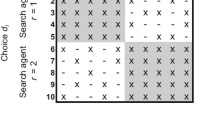Abstract
In this paper we study the effects of learning by reinforcement and adaptive change of distributed search systems’ organizations. We find that employing learning by reinforcement to direct organizational alterations of distributed search systems may lead to high levels of systems’ performance and this, in particular, with rather high efficiency in terms of effort of reorganization. The results also suggest that the complexity of the search problem together with the aspiration level, relevant for the positive or negative reinforcement, considerably shape the effects of learning.
Access this chapter
Tax calculation will be finalised at checkout
Purchases are for personal use only
Preview
Unable to display preview. Download preview PDF.
Similar content being viewed by others
References
Baumann, O.: Distributed Problem Solving in Modular Systems: the Benefit of Temporary Coordination Neglect. Syst. Res. Behav. Sci. 32, 124–136 (2015)
Bush, R.R., Mosteller, F.: Stochastic Models for Learning. Wiley, Oxford (1955)
Brenner, T.: Agent learning representation: advice on modelling economic learning. In: Tesfatsion, L., Judd, K.L. (eds.) Handbook of Computational Economics, vol. 2, pp. 895–947. Elsevier, Amsterdam (2006)
Carley, K.M., Gasser, L.: Computational organization theory. In: Weiss, G. (ed.) Multiagent Systems: A Modern Approach to Distributed Artificial Intelligence, pp. 299–330. MIT Press, Cambridge (1999)
Gross, T., Blasius, B.: Adaptive coevolutionary networks: a review. J. R. Soc. Interface 20, 259–271 (2008)
Kaelbling, L.P., Littman, M.L., Moore, A.W.: Reinforcement learning: a survey. J. Artif. Intell. Res. 4, 237–285 (1996)
Kauffman, S.A., Levin, S.: Towards a general theory of adaptive walks on rugged landscapes. J. Theor. Biol. 128, 11–45 (1993)
Kauffman, S.A.: The Origins of Order: Self-Organization and Selection in Evolution. Oxford University Press, Oxford (1993)
Levitan, B., Kauffman, S.A.: Adaptive walks with noisy fitness measurements. Mol. Divers. 1, 53–68 (1995)
Li, R., Emmerich, M.M., Eggermont, J., Bovenkamp, E.P., Bck, T., Dijkstra, J., Reiber, J.C.: Mixed-integer NK landscapes. In: Parallel Problem Solving from Nature IX, vol. 4193, pp. 42–51. Springer, Berlin (2006)
Rivkin, R.W., Siggelkow, N.: Patterned interactions in complex systems: Implications for exploration. Manage. Sci. 53, 1068–1085 (2007)
Sutton, R.S., Barto, A.G.: Reinforcement Learning: An Introduction, 2nd edn. MIT Press, Cambridge (2012)
Wall, F.: The (beneficial) role of informational imperfections in enhancing organisational performance. In: Lecture Notes in Economics and Mathematical Systems, vol. 645, pp. 115–126. Springer, Berlin (2010)
Wall, F.: Effects of organizational dynamics in adaptive distributed search processes. In: 12th International Conference on Distributed Computing and Artificial Intelligence. Advances in Intelligent Systems and Computing, vol. 373, pp. 121–128. Springer, Berlin (2015)
Wall, F.: Organizational dynamics in adaptive distributed search processes: effects on performance and the role of complexity. Frontiers of Information Technology & Electrical Engineering (in press)
Yongcan, C., Wenwu, Y., Wei, R., Guanrong, C.: An Overview of Recent Progress in the Study of Distributed Multi-Agent Coordination. IEEE Trans. on Industrial Informatics 9, 427–438 (2013)
Author information
Authors and Affiliations
Corresponding author
Editor information
Editors and Affiliations
Rights and permissions
Copyright information
© 2016 Springer International Publishing Switzerland
About this paper
Cite this paper
Wall, F. (2016). Self-Adaptive Organizations for Distributed Search: The Case of Reinforcement Learning. In: Omatu, S., et al. Distributed Computing and Artificial Intelligence, 13th International Conference. Advances in Intelligent Systems and Computing, vol 474. Springer, Cham. https://doi.org/10.1007/978-3-319-40162-1_3
Download citation
DOI: https://doi.org/10.1007/978-3-319-40162-1_3
Published:
Publisher Name: Springer, Cham
Print ISBN: 978-3-319-40161-4
Online ISBN: 978-3-319-40162-1
eBook Packages: EngineeringEngineering (R0)




